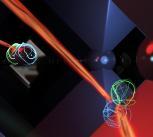
Submitted by Dr Nalin Patel on Fri, 15/04/2016 - 16:22
Scientists have discovered that a highly promising group of materials known as hybrid lead halide perovskites can recycle light – a finding that they believe could lead to large gains in the efficiency of solar cells.
By showing that they can also be optimised to recycle light, the new study suggests that this could just be the beginning. Solar cells work by absorbing photons from the sun to create electrical charges, but the process also works in reverse, because when the electrical charges recombine, they can create a photon. The research shows that perovskite cells have the extra ability to re-absorb these regenerated photons – a process known as “photon recycling”. This creates a concentration effect inside the cell, as if a lens has been used to focus lots of light in a single spot.
The interdisciplinary work involved a number of Winton Scholars, Monika Szumiło, Johannes Richter and Milan Vrućinić and was led by Felix Deschler and was carried out in the group of Richard Friend, Cavendish Professor of Physics. The research was undertaken in partnership with the team of Henry Snaith at the University of Oxford and Bruno Ehrler at the FOM Institute, AMOLF, Amsterdam.
The researchers now believe that perovskite solar cells may be able to reach considerably higher efficiencies than they have to date. “The fact that we were able to show photon recycling happening in our own cell, which had not been optimised to produce energy, is extremely promising,” Richard Friend, a corresponding author, said. “If we can harness this it would lead to huge gains in terms of energy efficiency.”
The results were reported in the journal Science, and further information can be found via this link.

